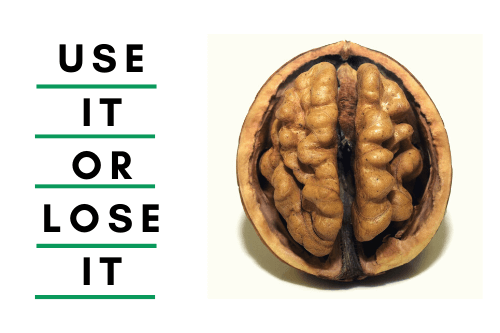
YouTube / iTunes / Spotify / Radio Public / Pocket Casts / Google Podcasts / Breaker / Overcast
Listen to ArtisanEnglish.jp posts & lesson intros here.
Proverb: Use it or lose it
How much of what you studied in your school days do you remember?
Well, if you can’t remember your school days, then you definitely can’t remember what you studied.
All this goes to prove my point: use it or lose it.
Use it or lose it means that the best way to maintain a thing of value is to use it.
Things need to be used, or else they deteriorate.
If you are a human, you are probably learning something.
The exciting thing about being alive is that there is always something to learn.
The sad thing about being human is that there are just as many things to forget as there are to learn.
Like all things except an excellent wine, memory deteriorates over time.
After studying something, we either have to use it or lose it.
This is especially true for language learners.
To recognize a new word, you have to see it at least five times.
It’s like recognizing a face.
You may know you met the person before, but you still can’t remember their name.
Regarding new words, you need to use them in a meaningful way at least twenty more times before they are firmly placed in your memory.
Then the fun begins.
Now you have to continuously use that word to renew your memory of it to prevent it from gradually fading away over time.
Use it or lose it, as they say.
Languages are alive; they are meant to be spoken, read and used often.
Like any skill, the more regularly you practice, the more skilled you become.
If you are reading this post, you are exercising your language skills, and I say more power to you!
Like or follow ArtisanEnglish.jp on social media.
Flesch-Kincaid Readability Test
This post is understandable by someone with at least a 7th-grade education (age 12).
On the Flesch-Kincaid reading-ease test, this post scores 76.
The higher the score on a scale of 0 – 100, the easier the passage is to read.

